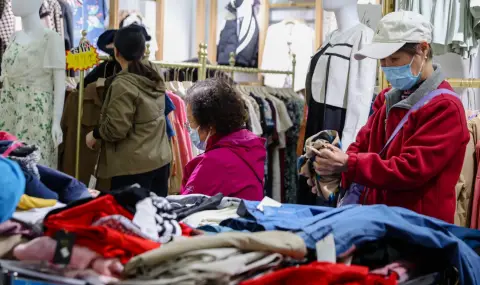The rise of trade through platforms like "Shane" (Shein) and Temu (Temu) leads to health hazards, increased environmental damage and obstacles to sustainable business models that the European Commission promotes. This is written in the position of the Bulgarian Association "Circular Textiles", received today in BTA.
These Chinese online platforms subsidize orders below cost and rely on aggressive advertising. In this way, they take away the market from local dealers, including second-hand ones. While consumers benefit from low prices in the short term, this eliminates competition that cares about good trading conditions, the position reads. The European Commission designates "Shane" and "Theme" as "very large platforms", which imposes stricter control over their activities and hinders the development of circular business models, experts quoted by BTA point out.
Chinese online shopping sites benefit from a duty-free minimum of €150 for third-party goods. In this way, they flood our market with a huge amount of products, mainly from textiles. However, they do not pass sanitary control, which creates real conditions for health, according to the association.
They say investigations have revealed high levels of dangerous chemicals such as lead, perfluoroalkyl (PFA) and phthalates in Shane's products, exceeding EU regulatory limits. For example, tests in South Korea found that children's items contained phthalates 428 times above the legal limit. The presence of toxic chemicals in materials is associated with health risks for both consumers and workers in production chains, the industry association said.
Another negative aspect is related to the manufacturing and working conditions under which the Chinese goods sold are produced. Allegations from 2022 indicate that "Shane" imported cotton from Xinjiang in violation of the Law on the Prevention of Forced Labor. There are other reports of exploitative labor practices and poor working conditions.
"The negative impact on the environment is undeniable. As we know, the fashion industry contributes to 10 percent of global carbon emissions. Goods sold through Chinese platforms are mostly made of plastics and non-recyclable materials. The rapid production cycle and the low rate of reuse contribute significantly to the increase in textile waste," the position reads.
Each day, 88 Boeing 777 cargo planes are needed to service cargo sent by Chinese e-commerce sites. This shows the growth of the two companies that are currently leaders in the segment - "Temu" and "Shane". 50 million packages of cheap Chinese clothes from their companies arrive in Europe every month. According to expert Christoph Tripp, "Shane" already controls 20 percent of the so-called fast fashion market. The two companies exceed revenues of more than 90 billion dollars for this year.
According to the European Commission, up to 65 percent of shipments to the EU are undervalued in documents in order to avoid customs duties, and the commission has the right to intervene in cases where foreign subsidies lead to disruption of the internal market of the European Union. A total of 1 billion shipments enter the EU in 2022, possibly 2 billion in 2023. The gross value of goods sold through "Temu" is $290 million. After that, market activity increased more than 4,500 times over the year to reach $13.8 billion in 2023. Because of inflation, Europe is forecast to see sales of Chinese platforms rise, experts say.
